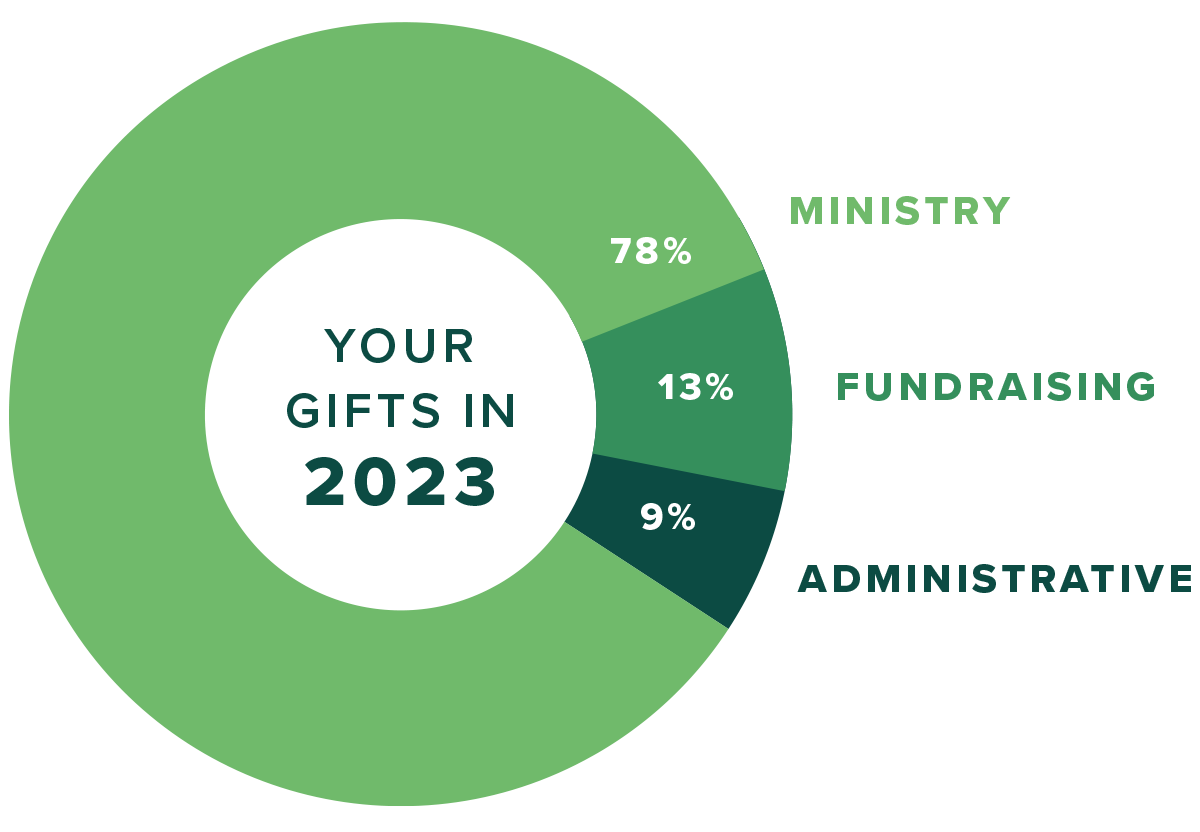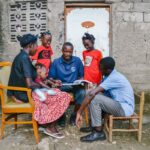How a Teacher’s Patience
A Child Champion in Kenya has a routine of praying for her students individually while also listening to their needs so she can help them thrive despite living with the hardships of poverty.
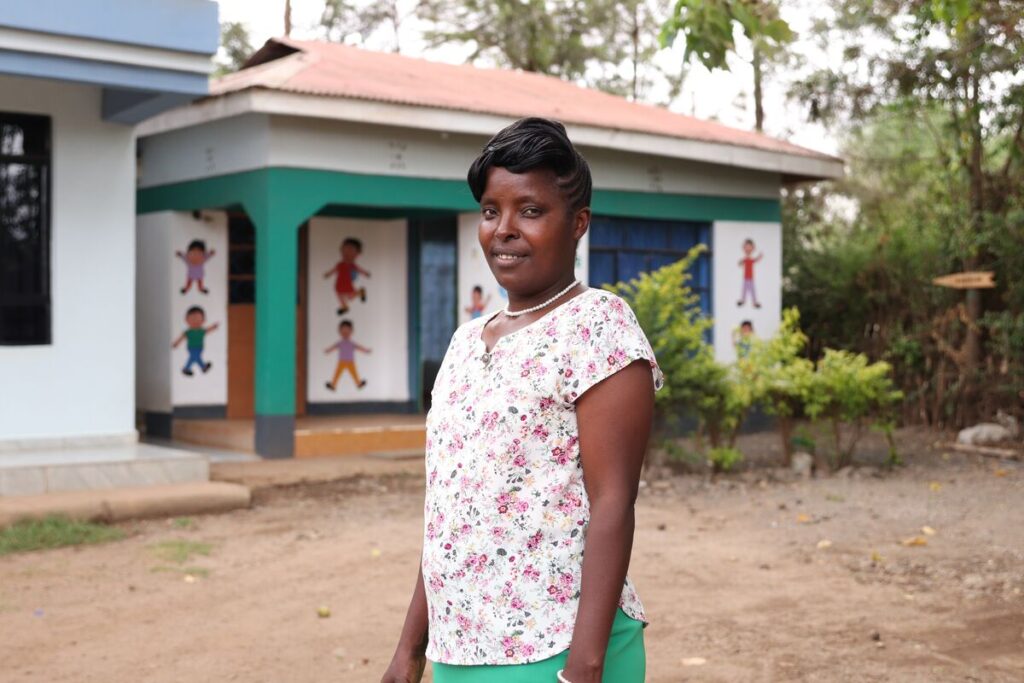
Esther is a Saturday Program Facilitator at PEFA Kimana Hope Center in Kimana.
“God is the one working in these kids and He makes whatever effort we put into them count. Otherwise, we would be laboring in vain,” says teacher Esther Njambi.
Esther is a Saturday Program Facilitator at PEFA Kimana Hope Center, located in Kimana, a small town 113 miles southeast of Nairobi.
On program days, Esther begins her day at the center at 7 a.m. When she arrives, she heads to her classroom, cleans it, arranges all the chairs and tables for her kids, then begins planning her lessons.
Preparing the Class in Prayer
Her classroom has 33 kids. Before the kids arrive at the Hope Center, Esther ensures that notes for the day’s lesson are written on the board, along with a song and a Bible verse.
Then, before the kids arrive at 8 a.m., Esther closes the door and begins praying for the kids while touching the desks and chairs they use.
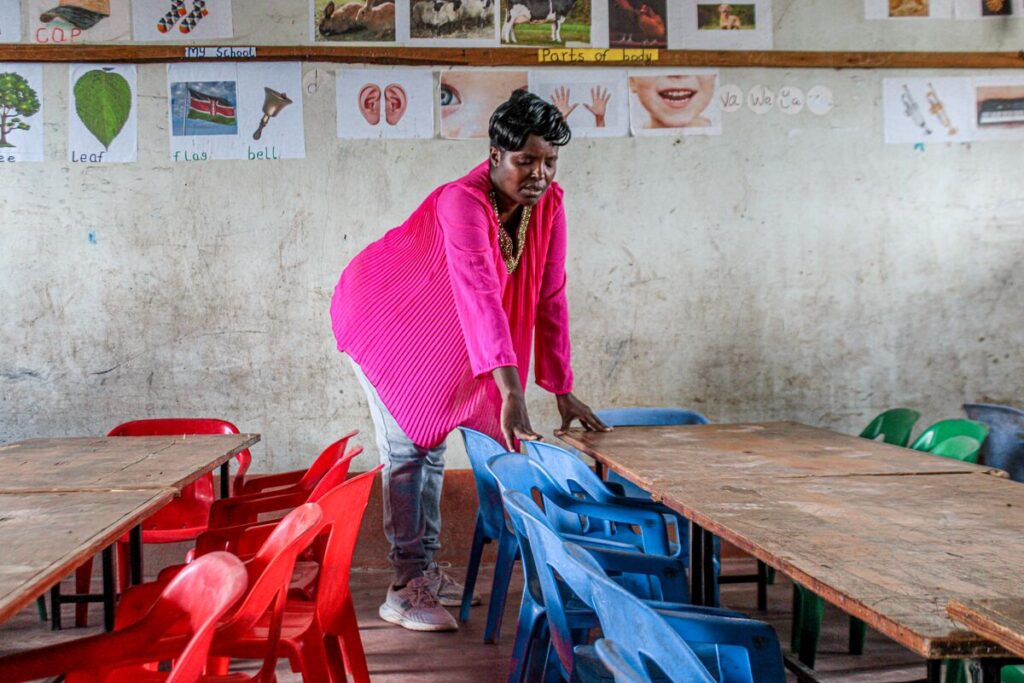
Before the kids come to class, Esther touches each chair and says a prayer for each child.
“I always pray that they all come to the center and that no one misses. I also ask God to settle any worries they might be having from the week, and that they may understand what I teach them,” Esther says.
This practice of cleaning the classroom and praying for the kids is one she began 11 years ago when she became a Sunday school teacher at the church.
Curiosity Leads to a New Path
Before becoming a teacher, Esther was just attending church and returning home. But as days went by, she became curious and wanted to know what happens when her kids and others go to Sunday school.
She approached the leaders in her church and asked if she could volunteer as an usher in Sunday school.
“I used to hear the noises the kids made before and after the classes,” Esther recalls. “I just wanted to know why the commotion was there, yet we were in church. So, I offered to become an usher to just help the teachers manage the big number of kids.”
As time went by while ushering in Sunday school, she gained interest in becoming their teacher, something she says she had never thought of. before.
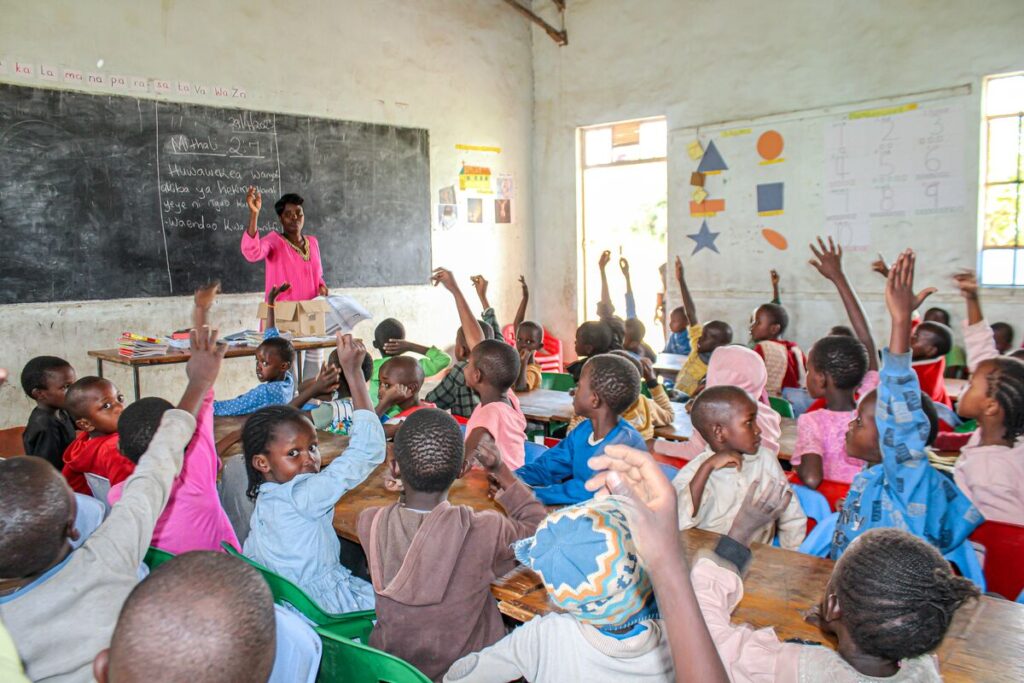
Esther in her classroom.
“I knew I was impatient, and my level of tolerance was so low that I never considered teaching kids. But while ushering, I felt drawn toward interacting with them at a deeper level, and I wanted to teach them,” she says.
So, Esther applied for and completed the training that her church offers to prospective teachers. She currently handles a total of 54 kids ages 6 to 7 years old.
A Place She Never Dreamt of
Serving kids is something Esther says she never dreamt of doing. As a child, she wanted to pursue a career in catering.
But her dreams fell apart when she lost her mother while in her second year of high school. After her mother died, her father remarried, and as soon as she was done with high school, Esther was forced to leave their home.
Esther was left to live with different relatives where she provided free labor as a housemaid until she got married at age 23.
She says a chance to serve the kids is an opportunity she feels God reserved for her at an older age.
“Serving the kids has made me a better mother and there is so much joy in walking in the community and hearing kids shout ‘teacher’ as they greet me,” says Esther, 46.
When the Hope Center at the church opened in March 2022, Esther was among the church members who volunteered to serve the kids there.
This was after she and her eldest daughter, Stephanie, had earlier volunteered to help in the long registration process when 100 kids in poverty were enrolled into the program.
She describes her first day with the kids after the launch of the center as “different.”
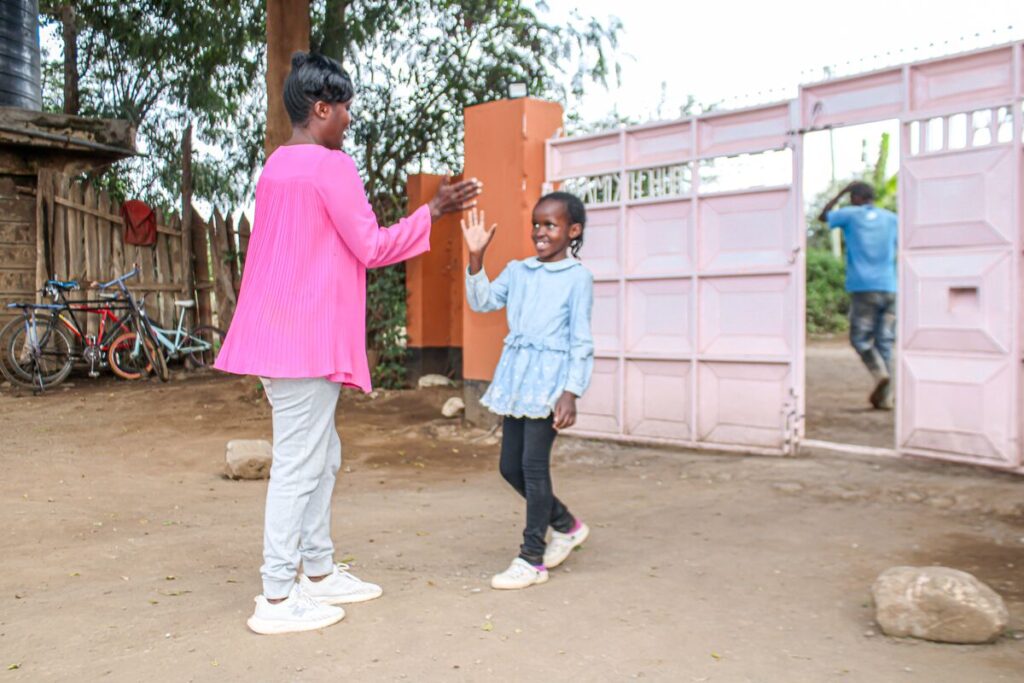
Esther greets a child with a high-five.
“I thought I knew how to handle all or at least most kids, but I was wrong,” Esther says. “It is easier at Sunday school because most of the kids together with their parents have been attending church, so they are so familiar and easy to get along with.”
At the Hope Center, she says, most kids were neither attending school nor church. Most had no idea what a church is because their parents didn’t either.
Because of that, despite some being older than 4, the kids had never had any experience with sitting down, paying attention, and being taught.
Esther also realized that most of the kids were from child-led families because their parents were out working and unavailable at home.
How Poverty Leaves Kids on Their Own
In Kimana, most poor families have parents who work on tomato farms as casual laborers and earn the equivalent of $10 a day picking tomatoes for more than 12 hours.
In the wee hours of the morning, it’s common to meet mothers carrying huge empty baskets on their backs waiting for lorries heading to the tomato farms.

In Kimana, most poor families have parents who work on tomato farms as casual laborers and earn the equivalent of $10 a day picking tomatoes for more than 12 hours.
They are given work on a first-come, first-served basis. So, they must leave home at around 4 a.m. to be able to catch a free ride on the back of the lorries heading to the farm, which saves them money.
This leaves the kids alone at home for the whole day until 9 p.m. when the mothers return from the farms.
Most parents depend on the eldest child to care for all the other kids while they are away.
“The kids have no one to look up to. The eldest child has no parental skills so there’s no order. No good food or supervised body hygiene for the kids, and those are the kids we have at the center,” Esther says.
She also says that some of the kids had not experienced eating from their own plates or using the toilet. On top of that, there was the normal anxiety that kids have with experiencing a new place for the first time.
“It was a special experience. It was so new, and it opened my eyes to the realities of kids in poor families,” Esther says. “I went home feeling beaten, and I wondered whether I was qualified enough to handle the kids. But my husband encouraged me and prayed for me that evening.”
And slowly, slowly, she says, she figured out how to serve the kids better.
In addition to teaching in her classes with the kids, she patiently potty-trained the kids who needed the training and helped them get comfortable with eating food on their own plates.
After some time, Esther realized that despite all the kids coming from poor families, they each faced unique challenges.
Transforming Lives Through Prayer
“One common thing among all the kids is poverty,” she says. “But they each have different challenges they face and for those with similar challenges, the intensity is different.”
This understanding led Esther to ask Everlyn, the Child Champion, for the list of kids in her class. Esther told her that she wanted to pray for the kids, one by one.
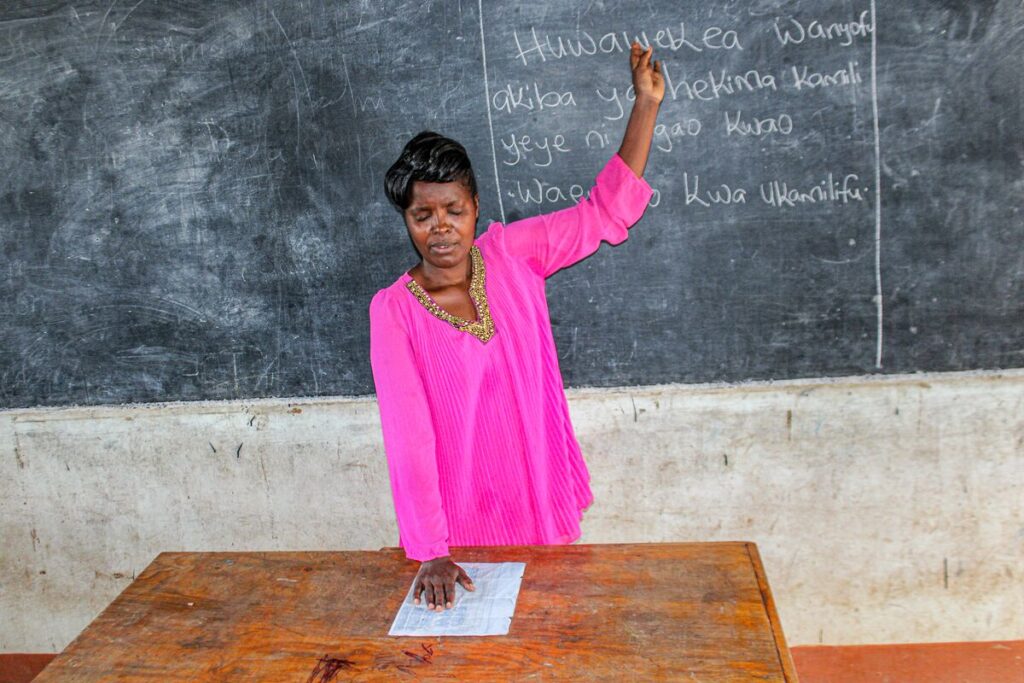
Esther has seen the power of prayer transform kids in hard places.
“I was amazed by that,” Everlyn says. “It showed how devoted she is to this work. Because it is easier for someone to pray for all kids collectively rather than individually.”
Esther says she prepared a schedule to ensure that she could pray for all the kids.
She wakes up at 4 a.m. to pray for them daily. After mentioning the different challenges and needs of a child and their family, she asks God to heal them and give them peace in the different hard situations they are in.
“I want them to achieve their full potential despite all that happens in their lives,” she says. “But I know that difficult situations can hinder a child from concentrating while in school or at the Hope Center.”
After months of praying for the kids individually, Esther says she has seen transformation in some of things she trusted God to work on.
Leaning in and Listening
In her class, Esther had a girl, Nosim, who still had not uttered a word even months after the Hope Center opened.
“I wondered what might have happened to her. I thought about all the possible kinds of trauma she might have undergone that made her quiet and nonresponsive to any of my talks to her. I asked her parents, and they said that that is how she was. But I knew something was not OK with her,” Esther recalls.
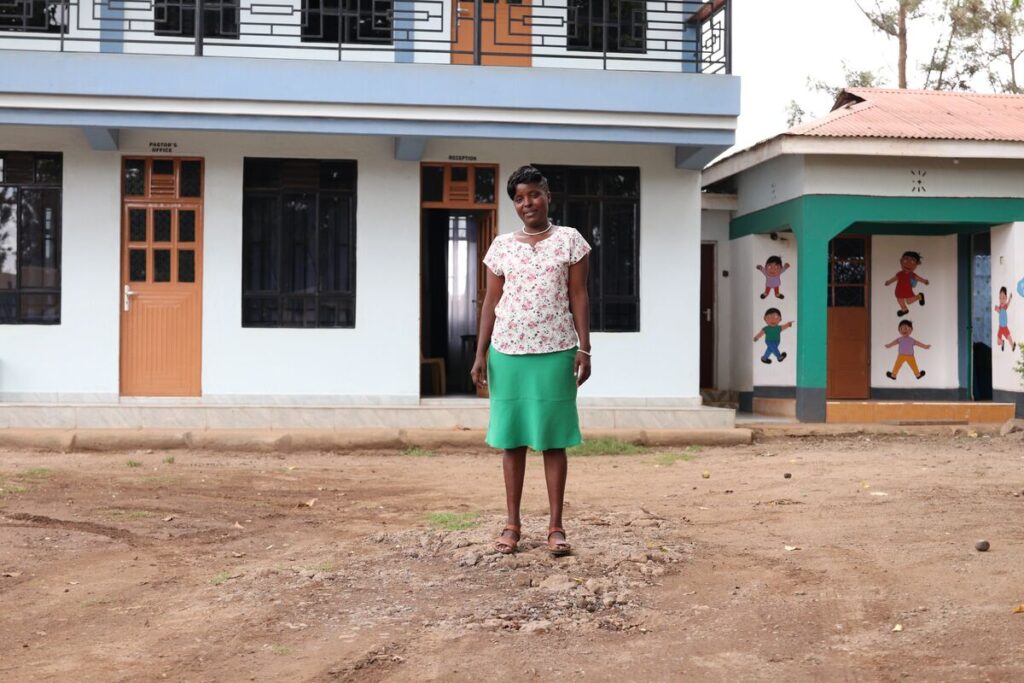
Esther loves when students run up to her and call her “teacher” when she’s walking around the neighborhood.
But Esther’s consistent talks with Nosim bore fruit. She now talks to teacher Esther and has slowly started conversing and interacting with other kids at the center.
Esther also says there is harmony in class and now the kids enjoy each other’s company and love being at the Hope Center.
“It is hard for the kids to deal with inconsistency. When they meet peace, tranquility, and available adults at the Hope Center, yet when they go back home, there is none of that. They get so confused,” she says.
“So, they express their frustration differently at the center, which makes learning difficult. But I am glad that God has softened their hearts which has allowed them to understand what I teach.”
Beyond the Walls of the Hope Center
Esther’s experience of serving kids at the Hope Center also motivated her to open her home to kids in her neighborhood.
Once a week, she invites kids to her home, prepares meals for them, and in the process teaches them about God. Most of the kids she serves in her home do not go to church, but their parents allow them to be taught by Esther.
“I began with less than five kids, and slowly by slowly, they started coming with their friends and now I have 20,” she says.
To Child Champions around the world, Esther says, “There is much we can do as Child Champions, but I know that God plays a big role is transforming kids from their hearts and healing wounds we would never heal, unless He intervenes.”
Provide hope, love, and support to a child living in poverty by sponsoring a child today!
We are accountable to the children we serve AND to our donors.
Our accountability to our donors is one of our highest priorities. Our goal is to use the funds entrusted to us as wise stewards. To do this requires continued monitoring of our fund distribution. OneChild is also a member in good standing with the Evangelical Council for Financial Accountability (ECFA)
